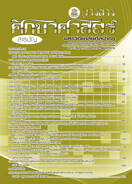การออกแบบการเรียนการสอนเชิงระบบโดยใช้แบบจำลอง ADDIE : การพัฒนาการคิดแบบเมตาคอกนิชัน (Metacognition) ของนักศึกษาพยาบาล
Main Article Content
Abstract
การออกแบบการเรียนการสอนเชิงระบบ (Instructional System Design: ISD) สามารถสังเคราะห์แบบจำลอง การออกแบบการเรียนการสอน ADDIE Model ตามแนวคิดของสตีเวน เจ แมกกริฟฟ์ (2008) (Steven J. McGriff, 2008) โดยอาศัยหลักของวิธีระบบ (System Approach) 5 ขั้นตอน คือ 1) Analysis, 2) Design, 3) Development, 4) Implementation, 5) Evaluation เพื่อพัฒนาการคิดแบบเมตาคอกนิชัน (Metacognition) ของนักศึกษาพยาบาลตามแนวคิดของมาร์ซาโน (2007) (Marzano’ s New Taxonomy, 2007) 3 ระบบ 1 ขอบเขต ดังนี้ 1) ระบบตนเอง (Self-System) 2) ระบบอภิปัญญา หรือระบบการคิดทางปัญญา หรือความตระหนักต่อกระบวนการคิด (Metacognitive System) 3) ระบบปัญญา (Cognitive System) 1 ขอบเขตความรู้ (Knowledge domain) คือ 3 ด้าน ดังนี้ 1) ความรู้ด้านเนื้อหาสาระ (Information) 2) ขั้นตอนทางจิต (Mental Procedures) 3) ขั้นตอนทางกายภาพ (Physical Procedures) ซึ่งมนุษย์จะสามารถพัฒนาการคิดแบบเมตาคอกนิชัน (Metacognition) ได้บนพื้นฐานของการมีสมองที่ดี (Good brain)ที่จะพัฒนากระบวนการคิดให้เกิดผลสัมฤทธิ์ทางปัญญาซึ่งส่งผลให้สมรรถนะของวิชาชีพพยาบาลและผลการเรียนรู้ตามมาตรฐานคุณวุฒิระดับอุดมศึกษาแห่งชาติสูงขึ้น
Instructional System Design (ISD) by ADDIE Model: The Development of Metacognition of Nursing Students
Instructional System Design (ISD) can synthesis ADDIE Model by Steven J. McGriff (2008) to system approach five steps 1) Analysis, 2) Design, 3) Development, 4) Implementation, 5) Evaluation. For the development of Metacognition of nursing students by Marzano’s New Taxonomy (2007). Marzano’s New Taxonomy have three systems and knowledge domain. The three systems are the Self-System, the Metacognitive System, and the Cognitive System. The Knowledge Domain are Information, Mental Procedures, and Physical Procedures. Human can the development of Metacognition based on have good brain. For development thinking process make cognitive achievement effect the high competency nursing profession and learning outcomes according to Thai Qualifications Framework for Higher Education.Article Details
Section
บทความวิชาการ (Articles)


